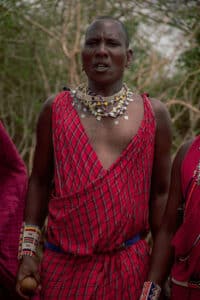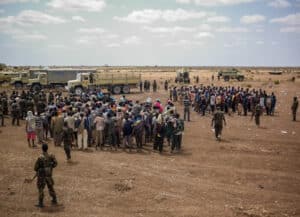Most Kenyans put a lot of stock in what they believe about life. Many people go to their place of worship to meet up with friends, family, and even strangers, as well as to practice their faith. There is a lot of overlap between local and native beliefs and customs and Christianity. Because of this, spirituality in Kenya often shares practices and ideas instead of being in conflict with each other.
Spirituality In Kenya
82.1% of the people, or the majority, say they are Christians. 47.7% of people say they are Protestant, 23.4% say they are Catholic, and 11.9% say they are from a different branch of Christianity. The rest of the population is made up of 2.4% of people who say they are not religious, 1.6% of people who say they are “other,” 11.2% of Muslims, 1.7% of traditionalists, and 0.2% of people who did not say what religion they were.
Spirituality And Kenyan Law
Religion-based discrimination is against the law, and the constitution says that there should be no official state religion.
The constitution says that everyone has the right to practice and preach any religion they want, both in private and in public. It also says that people can talk about and practice any religion in public.
The constitution also says people can’t be forced to do anything that goes against their religious or philosophical beliefs. The constitution says that everyone has the right to practice and preach any religion they want, both in private and in public. It also says that people can talk about and practice any religion in public.
The constitution also says people can’t be forced to do anything that goes against their religious or philosophical beliefs. The only way to restrict these rights is through the law, and even then, only if it is “reasonable and justifiable in an open and democratic society.”
Christianity In Kenya
Different kinds of Christianity are practiced all over the country. In 1844, when missionaries moved to the area around Mombasa, they brought Christianity to Kenya. At the beginning of the 20th century, many Kikuyu started their own churches and schools so they wouldn’t have to be ruled by missionaries.
This history focuses on the differences between the main Protestant and Catholic churches in modern-day Kenya and the African Independent Churches. Urbanites are becoming more interested in Pentecostal churches and other charismatic Christian groups.
Christians from different churches usually live together and talk to each other in a peaceful way. Members of different religions would sometimes get together for private prayer meetings.
Christianity is the most common religion in Kenya and has a big impact on the country today. Christian ideas about the family and marriage have changed traditional ways of doing things. There are churches all over the country, so a lot of people go to church on Sunday.
People often have religious symbols or pictures of holy places in their homes, workplaces, or cars. In Kenya, one of the most important parts of Christian worship is the use of music, rhythm, dancing, and singing.
Islam In Kenya
Islam first came to Kenya in the eighth century, when Arab Muslim traders started to settle in the ports along the east coast. The Swahili language and people came about when the native Bantu people and the Arab Muslims who moved to Kenya got together.
At the moment, Islam is the second most common religion in Kenya. In fact, there is at least one mosque in most towns and cities in Kenya. Even though many Muslims in Kenya follow the Shi’a and Ahmadiyya traditions, most of them are Sunni.
Most Muslims live in the northeast and along the coast, but there are also large groups of Muslims in many parts of Nairobi. Religion and ethnicity are often linked because most people in many different ethnic groups have the same religious views. For example, most Muslims are of Somali or Swahili descent and live in the coastal area.
Most people from the Kikuyu, Luhya, Kalenjin, Luo, and Kamba groups are Christians. More than 230,000 refugees and people looking for asylum live in the Dadaab refugee camps on the Somali border.
Most of these people are Muslim Somalis from Dadaab. In the country ‘s northwest, the Kakuma refugee camp is home to more than 177,000 people of different religions, such as Somalis, South Sudanese, and Ethiopians.
Native And Local Religions
In Kenya, people have many different ways of looking at the world. Different origin myths, traditions, and superstitions are part of the native beliefs of each ethnic group. For example, some Kikuyu people believe that Mount Kenya is where “Ngai” (or “God”) lives. On the other hand, the Kikuyu used to pray while facing a mountain.
Most of Kenya’s native worldviews are made up of two parts. The first is the belief that the spirit world and the human world are the same. You can talk to gods through your ancestors, deities, or local spirits.
Some people may also talk to shamans, clairvoyants, or “witch doctors,” who are thought to be able to bridge the gap between the physical world and the spiritual world. Kenyan indigenous spiritualities also place a lot of importance on ancestors and their ability to talk to the living.
Many ethnic groups put a lot of value on honoring one’s ancestors. Other tribes believe that their ancestors come back to life as their own children, but the Luo believe that their ancestors’ ghosts or spirits roam the earth. You can also consult in Straight Forward Guidance for more information on the ancient practices of old religions not only in Kenya but over the world.
 Kenya’s Spirituality Has Grown In Recent Years
Kenya’s Spirituality Has Grown In Recent Years
Kenyans who work in development told us a lot about how Western secularism has influenced how the Kenyan government runs.
Both secular and religiously inspired development players talked about the huge potential that religious leaders and faith communities may have to help solve long-term problems like corruption, high birth rates, gender equality, or ethnic conflicts. They believe that religious leaders and religious groups are often the keys to solving problems.
Even though some worries about different kinds of religious activity may be well-founded, a general, stereotypical view of secularism is not likely to match Kenyan reality.
International players in development should be aware of their religious biases if they want to make sure that projects are set up correctly in the Kenyan context. This is likely to lead to more interaction with religious leaders and more discussion of the religious implications of issues like family planning and gender roles.
Terrorism And Threats To Religion In Kenya
Al-Shabaab is a terrorist group based in Somalia. It attacked again in the northeastern counties of Mandera, Wajir, Garissa, and Lamu, sometimes targeting non-Muslims because of their religion.
In January, a Christian advocacy group called Open Doors said that there was a rise in violence against Christians, especially in the northeast, where al-Shabaab was blamed for several threats and attacks.
Al-Shabaab militants killed three people in June when they attacked two buses in Mandera County, which is close to the Kenyan border with Somalia. According to the news, the attackers were trying to hurt people who were not Muslims.
NGO sources say that some Muslims and their families were threatened with violence or death, especially those who had switched from Islam to Christianity or were of Somali descent.
People Also Ask
What is the main religion in Kenya?
As of 2019, the government thinks that about 85.5% of the total population is Christian and about 11% is Muslim. Hindus, Sikhs, Baha’is, and people who follow other traditional religious beliefs make up less than 2 percent of the population.
What was the religion in Kenya before Christianity?
Before Christianity came to Kenya, the people who lived there had a number of traditional tribal beliefs. Each tribe usually followed monotheism, which is the belief that there is only one God, also called “Ngai” or “Were.”
What are some cultural traditions in Kenya?
Christians, Muslims, and Hindus all have strong beliefs about their religions. Sunday is the most important day for Christian families because they spend almost the whole day at church. In Kenya, women have always taken care of housework. Men sometimes try to help out around the house, but this doesn’t happen very often.
Conclusion
Because they have been involved in development programs for a long time and have had a big impact on Kenyan society, faith actors play a big part in Kenya’s future sustainable development.
Development workers would do well to recognize the important role that religious actors and institutions have played in Kenya’s past and present and to learn from them to help build a better future as the government continues to expand and deepen its development work.


